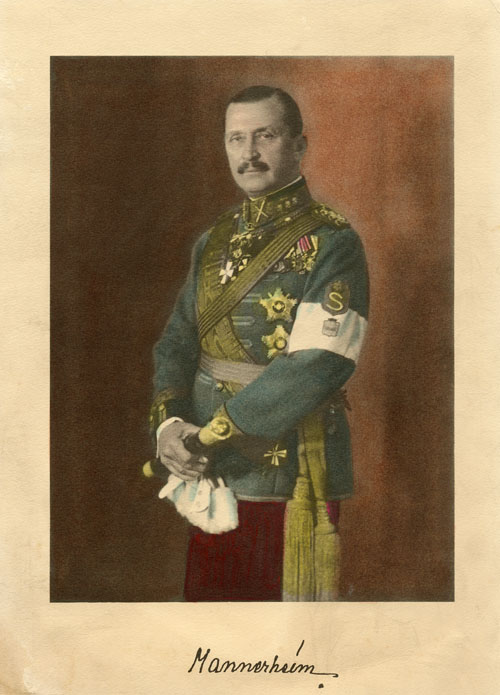The Hero of Finnish Freedom

This page is my humble tribute to the greatest Finn of all time, baron
Carl Gustaf Emil Mannerheim (1867-1951). He was the Commander-in-Chief
during the Finnish Freedom War of 1918 and again during the Second
World War when Finland fought two wars against the Soviet Union: the
Winter War (1939-1940) and the Continuation War (1941-1944), during
which he was given the title Marshal of Finland.
Being a popular and experienced military leader C. G. E. Mannerheim was
appointed as the leader of the Finnish military forces when communist
sympathisers beguiled criminals and lower echelons of working classes
into a rebellion against the legally elected government. The aim of
the rebels was to make Finland a communist state, i.e. a state
governed by working classes with all resources and funds and property
nationalised for them to distribute among all working class people.
The ideology of the rebels was so close to that of the bolsheviks in
Russia and their preferred political system so weak that Finland would
soon have been incorporated into the Soviet Union. A good example on
the system the rebels tried to establish comes from the Freedom War,
in which they went on a rampage through the country killing summarily
all people who either were in or for the legal government or who
refused to support either side.
The military skills of General Mannerheim were essential in winning a
victory in the Freedom War. Hence he can be considered as the
embodiment of the freedom Finland achieved in 1918.
Another instance of General Mannerheim's impact on freedom in Finland
came in 1929 when right-wing radicals tried to establish him as a
dictator of Finland. He refused.
Largely due to the wide national support General Mannerheim enjoyed in
Finland after the wounds of the Freedom War had substantially healed,
he was a popular leader, as a Field Marshal, in Finland's struggle to keep
Soviet invaders out when Stalin orderd a massive assault against Finland on
30 November 1939. Under the leadership of a lesser man Finnish soldiers
would not have achieved what came to be known as "the miracle of the Winter
War". Under pressure of an overwhelming enemy Finnish troops stood their
ground and inflicted such a blow to the Red Army that Stalin had to
call off the assault in March 1940.
The love and veneration Finnish soldiers had for their Commander-in-Chief,
and their ensuing feat, entitle Marshal Mannerheim another nomination
as the hero of Finnish freedom.
When Germany invaded the Soviet Union in July 1941, Stalin considered it
vital for his survival to keep Germany from opening a northern front
through Finland and commanded another assault to take Finland. This time
he was in alliance with great supporters of Finland, the United Kingdom and
the French patriots fighting to regain their homeland from Germany. Stalin
could not just invade Finland, but he had to stage an incident in which
the Finns allegedly fired into Soviet territory. Finland found itself
again in war with the Soviet Union and this time had to find an ally.
The only remaining option was Germany, who was more than happy to lend
a helping hand. After all, Germany gained thus a northern front against
the Soviet Union.
Yet another example on the skills of now Marshal Mannerheim came through
his refusal to cut off the supply lines of Leningrad - largely surrounded
by German troops. This and other such measures gained Finland a less hostile
attitude by Soviets once the war was over and the peace treaty was
negotiated. Admittedly the Finnish military did some strategic mistakes
during the Continuation War - such as moving over the old border into
the Soviet area. It is, however, difficult to say how much such decisions
affected Finland after the war, especially if they were in any way
vital in helping Finland in stopping the Red Army assaults again.
Marshal Mannerheim concluded his fine career becoming the sixth President of
Finland after the war, a position he held only for two years, a third of the
normal term, due to health reasons.
A man who saved the infant Finland only a year after the declaration of
independence from rebellious thugs, again from the terror of Stalin, twice,
and always supported the democratic system in Finland, can not be called
anything else than The Hero of Finnish Freedom. More than fifty years
after he passed away he was still voted as the greatest Finn of all time
gaining almost a third of all votes in a national contest organised in 2004.
 Links
Links

